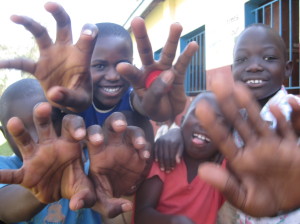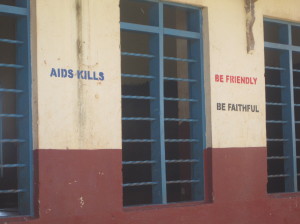A bit later than anticipated this blog, due both to Hotel Brovad’s aversion to supplying functioning internet (although given the lack of functioning water for 2 days this should not have come as a surprise) and the dangerous slip back into the work/pub/sleep cycle that for a too-short fortnight seemed a world away.
A!B!C!(T!):
Q: “What are you going to be doing in Uganda?”
A: “I’m going to be coaching cricket and linking the sport to HIV prevention messages”
Q: ”Riiiiiiiight”
In the weeks leading up to our recently completed Uganda trip, I had versions of this conversation more times than I care to remember. As the HIV/AIDS ‘officer’ for Uganda Spring 2013, I have been keeping an eye that we successfully incorporate HIV prevention messages in to the cricket training. In general, the ability to link cricket coaching and HIV messages is not intuitive, and it would be fair to say it took our team a few goes to get it to a stage where it felt natural rather than forced. By Masaka though we were all highly confident, culminating in the increasingly polished end of day vignettes performed by Paul, Graham and latterly Sam (which could have been improved only by a cameo appearance from Jennifer Lawrence). Hopefully a video of one of these mini-masterpieces will be posted soon.
You soon come to realise that the ABC messages are not new. Uganda has been promoting sensitisation programs for a number of years, and the levels of awareness of coaches and kids were clearly high from the outset. So why us as well? What are we adding? They key is the medium – by linking these messages to cricket training we are delivering them in a way that is potentially more engaging. This is critical; during a visit to Kyomya School outside of Jinja, we learnt that the pupils have weekly HIV/AIDS lessons right all the way through from primary to secondary. How do you ensure that the audience doesn’t become indifferent to this constant barrage? The only way is to keep the medium fresh, to link the messages to different aspects of the pupils’ lives at that time, be it at home, in their social groups or to their sporting activities.
A Long Shadow:
Despite this, when you are training a horde of excited and energetic kids the misery of HIV/AIDs can seem a world away. But you don’t need to scratch too hard to reveal the toll that HIV has taken on the communities we’ve worked in. At the most basic level was the revelation through the coach’s questionnaires (administered to track HIV knowledge amongst the coaches and tracked over time) that they all knew someone with HIV, often a relative and in one case the coach himself. However a visit to the Uganda Cares HIV/AIDS clinic at Masaka Hospital brought it home even more vividly.
The clinic is modern and successful. It has a lab able to carry out vital tests of HIV progress and associated health metrics. Patients have access to potent ARVs and they have been able to recently lower the threshold of disease progression to allow patients to access treatment earlier. They are able to prevent mother-to-child transmission in 80%-90% of cases. However they are currently serving 30,000 patients. 30,000. Bear in mind that in the UK there are ~96,000 people with HIV in total. This one clinic is trying to serve nearly one third of that entire population. It’s mind-boggling. Patients are travelling huge distances to be seen there, and some are unable to access their services altogether. Moreover, far too many patients get to them too late, their immune system too badly compromised for treatment to be successful. The main reasons for this, outside of access issues, are fear and stigma, leading to a reluctance to get tested and a state of denial and a refusal to engage with medical services if a positive test occurs.
This really brings our purpose home. Seeing a mother with her child, both waiting for their joint-consultation, and sitting with kids waiting for their parents to return from the ARV dispensary it becomes clear. If through our efforts in Masaka we keep one kid out of the Uganda Cares clinic, or one gets tested early so they can benefit from ARVs and don’t spread the disease to partners/friends, we will have succeeded. That’s why we came.
Thanks everyone – until the next trip!




1 comment
Mike and Veronika Reeves says:
Mar 8, 2013
Well done Nick. A good blog which brings home the reality of HIV / AIDS out there. It seems as if the whole team did really well linking cricket to the messages that we are trying to get across.